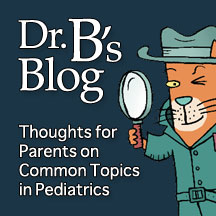When parents think about developmental stages in their children, the ones that come to mind are major milestones like smiling, crawling and talking, etc. Despite the obvious importance of these landmarks, I am queried on a regular basis about a handful of “lesser” behaviors children exhibit.
- Hand regard. Babies usually discover their hands by two months of age. This can happen in three ways. First, the baby purposefully sticks his hands or fingers in his mouth to suck on them. Second, the baby starts swatting at things. Third, the baby stares at a fisted hand held in front of his face. The last behavior is called hand regard. Parents may mistake hand regard for a seizure. If your child’s hand jerks rhythmically with this behavior, call your doctor. Otherwise relax and enjoy your baby’s new discovery.
- Developmental drooling. Humans have two types of salivary glands. There are tiny ones in the cheeks and floor of the mouth that function from the time of birth. The parotid glands, which produce large amounts of saliva required for swallowing solid foods, don’t mature until a baby is about 3 to 4 months of age. This corresponds to the baby’s ability to chew and stick his hands in his mouth with ease. Parents often conclude that a drooling 4-month-old is teething. In reality, it’s due to the maturation of the parotid glands.
- The fencing reflex. If you have a 2 to 3 month old, you may have noticed that he sometimes looks like he’s “fencing” when he’s lying on his back with his head turned to one side. The reflex consists of one arm extended and the other flexed as though the baby was getting ready to lunge at his opponent. The medical term for this posture is the asymmetric tonic neck reflex. It disappears by 6 months of age.
- The 6-month cough. Around six months of age, babies get more control over their vocalizations. In addition to babbling and guttural sounds, they often cough on purpose. You can recognize this cough because it is “throaty” rather than coming from deep within the chest. In addition, the child won’t have a runny nose or fever, and she will be acting completely normally except for the cough. The behavior lasts for a month or so, and then the baby moves on to other interests.
- Ear grabbing. I often joke with parents that when babies are first born, they consist of a stomach and a mouth. The stomach demands to be fed and the mouth is equipped with a sucking reflex to make this happen. This is an exaggeration, of course, because babies hear, see and respond to touch. They can even distinguish their mom from other women in the first few days of life. Despite these amazing skills, a newborn has little to no control over her arms and legs and doesn’t have a clue that she has a nose or other body parts. By 6 months, babies are very good at exploring their bodies. Hands and feet go to their mouths, and they often play with their bellybuttons. At 8 or 9 months, babies discover that they have ears. As a result, parents will often see their babies pulling and poking at their ears. This often makes parents wonder if the child has an ear infection. If your child doesn’t have a cold and isn’t fussy, there’s a very good chance that her ear tugging is body exploration rather than a sign of an ear infection.











